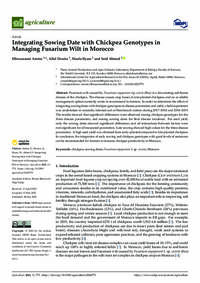Integrating Sowing Date with Chickpea Genotypes in Managing Fusarium Wilt in Morocco

Authors:
Integrating Sowing Date with Chickpea Genotypes in Managing Fusarium Wilt in Morocco: Fusarium wilt caused by Fusarium oxysporum f.p ciceris (Foc) is a devastating soil-borne disease of the chickpea. The disease causes crop losses in late-planted chickpeas and no available management option currently exists to recommend to farmers. In order to determine the effect of integrating sowing dates with chickpea genotypes on disease parameters and yield, a field experiment was undertaken in naturally infested soil at Merchouch station during 2017–2018 and 2018–2019. The results showed that significant differences were observed among chickpea genotypes for the three disease parameters, and among sowing dates for final disease incidence. For seed yield, only the sowing dates showed significant differences and all interactions between factors were non-significant for all measured parameters. Late sowing showed high values for the three disease parameters. A high seed yield was obtained from early-planted compared to late-planted chickpeas. In conclusion, the integration of early sowing and chickpea genotypes with good levels of resistance can be recommended for farmers to increase chickpea productivity in Morocco.
